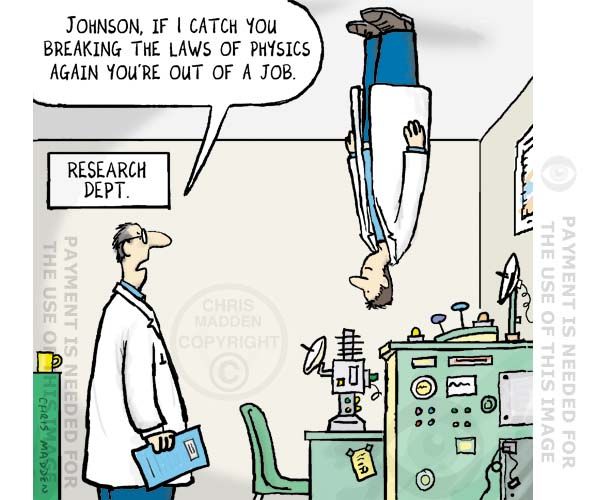
Alan Chalmers discusses the way that followers of the Philosopher David Hume deal with the problem of explaining the regularity without prescriptive laws. Chalmers represents the scientific realists, Humeans are their oppents. Followers of Hume believe that it's going too far beyond the bounds of what can be proven to suggest that laws govern things or that properties of nature produce the effect of governance. Chalmers goes back to the billiard balls to illustrate Hume's position. Hume argued that we don't see one ball moving the other but one ball stop and the other one start. We don't see the causal process so we must assume it. Hume believed that we don't have a rational warrant for belief in physical bodies or the external world. These must be assumed on faith.
At least Chalmer's and the realists are willing to admit there's a problem. I will demonstrate that his solution is little better than Hume's (in the next chapter). Humean refusal to move out of deniel is indicative of modern science as a whole. This law-like regularity is just a set of behaviors and natural laws are just descriptions of those behaviors, never mind how law-like they are. Chalmer's argument against Hume does not answer Hume, it just assumes that we know already that nature has active properties that make things happen. That's just refusal to believe Hume's logic. Hume's skepticism fuels atheist empiricism, that stands behind all their claims that there is no rational reason to believe in God. I wonder how many of them ever realize that according to Hume there's no reason to believe in the external world. Mattey says of Hume:
Consider the question whether we are justified in believing that a physical world exists. As David Hume pointed out, the skepticism generated by philosophical arguments is contrary to our natural inclination to believe that there are physical objects. Nonetheless, after considering the causes of our belief in the existence of body and finding them inadequate for the justification of that belief, Hume admitted to being drawn away form his original assumption that bodies exist. "To be ingenuous, I feel myself at present..more inclin'd to repose no faith at all in my senses, or rather imagination, than to place in it such an implicit confidence," because "'tis impossible upon any system to defend either our understanding or senses." His solution to these doubts was "carelessness and in-attention," which divert the mind from skeptical arguments.[1]Hume tells us:
[T]he skeptic . . . must assent to the principle concerning the existence of body, tho' he cannot pretend by any arguments of philosophy to maintain its veracity. Nature has not left this to his choice, and has doubtless esteem'd it an affair of too great importance to be trusted to our uncertain reasonings and speculations. We may well ask, What causes induce us to believe in the existence of body?, but 'tis in vain to ask, Whether there be body or not? That is a point, which we must take for granted in all our reasoning.” (A Treatise of Human Nature, Book I, Part IV, Section II)[2]For an answer to Hume I turn to Hume's contemporary opponent, Thomas Reid. More specifically to G.J. Mattey and his use of Lehrer and Reid. Thomas Reid (1710-1790) Scottish philosopher, leader of the “common sense” school. He studied Philosophy at Marischl college, Aberdeen. He served as a Presbyterian pastor. He influenced modern philosophers such as Charles Sanders Peirce.[3]
Reid argues that we are justified in following our senses.
That the evidence of sense is of a different kind, needs little proof. No man seeks a reason for believing what he sees or feels; and, if he did, it would be difficult to find one. But, though he can give no reason for believing his senses, his belief remains as firm as if it were grounded on demonstration...Many eminent philosophers, thinking it unreasonable to believe when they could not shew a reason, have laboured to furnish us with reasons for believing our senses; but their reasons are very insufficient, and will not bear examination. Other philosophers have shewn very clearly the fallacy of these reasons, and have, as they imagine, discovered invincible reasons against this belief; but they have never been able either to shake it themselves or to convince others. The statesman continues to plod, the soldier to fight, and the merchant to export and import, without being in the least moved by the demonstations that have been offered of the non-existence of those things about which they are so seriously employed. And a man may as soon by reasoning, pull the moon out of her orbit, as destroy the belief of the objects of sense. (Essay on the Intellectual Powers of Man, Essay IV, Chapter XX)[4]He doesn't put it in these terms but he's arguing that living by the assumption that perceptions are real, works. Ignoring that realization doesn't work. Now he does say that perceptions can be wrong and we need attention to detail.[5] But in general he's talking about justification of belief in the external world and physical bodies. People go about their lives doing what they do and assume the reality of the world works. Now a student of philosophy may think “but that's the average person who knows nothing of philosophy and doesn't think. No philosopher lives by Humean skepticism. When a philosopher makes love he or she does not pull back at the most climatic moment and say “is my partner here real? Is this real? Am I really doing this deed in this place? Philosophers who are drafted and sent to was don't walk into machine gun fire to see if the bullets are real. Reid argues that we have prima face justification to assume the reality of regular and consistent perceptions. Science couldn't really thrive on Humean skepticism. To a point skepticism is good for science since science is not about proving facts but testing hypotheses. Yet if we never assume the reality of perception why bother with empirical observation?
Lewis and systems
Of course Hume is assumed by modern philosopher to have won the show down with Reid (although I disagree). Now a follower of Hume's, David Lewis, has in the late twentieth century developed a means of explaining physical and natural laws that will quite likely be argued against the TS argument. Lewis has overhauled modal logic, possible worlds, and counterfactuals, as well as other fields.[6]In dealing with the question “what is a law?” there are two major approaches: David Lewis (“Systems,” o “systematized regularity theory”) and David Armstrong's (universals).[7]Systems are made up of two competing aspects, strength and simplicty. Strength here means better explained and proven. Because strength involves explanation there is automatically a tradeoff between strength and simplicity. We can make a hpothesis stronger by explaining in more detail. But at the coast of simplicity. We can make them more simple by streamlining explanation, but at the coast of strength. “According to Lewis (1973, 73), the laws of nature belong to all the true deductive systems with a best combination of simplicity and strength.”[8]
One last aspect of the systems view that is appealing to many (though not all) is that it is in keeping with broadly Humean constraints on a sensible metaphysics. There is no overt appeal to closely related modal concepts (e.g., the counterfactual conditional) and no overt appeal to modality-supplying entities (e.g., universals or God; for the supposed need to appeal to God,.... Indeed, the systems approach is the centerpiece of Lewis's defense of Humean supervenience, “the doctrine that all there is in the world is a vast mosaic of local matters of particular fact, just one little thing and then another” (1986, ix). [emphasis mine].[9]One reason why thinkers like this view, apparent from the quotation, is the alleged use of Occam's razor saving God out of the picture. I have dealt with that in chapter three. God is not multiplying entities beyond necessity, since God is not subject to physical law. The necessity if God cannot be understood in terms of science or physical law. Another problem with this approach is that it really contributes nothing toward answering the question about the nature of physical laws, ie descriptive laws appear to be descriptions of of prescriptive laws. If we decide that laws are the best balance between strength and simplicity, that does not prove that the law-like regularity is not the result of some external organizing principel or transcendental signified. Laws can be a balance between strong and simple, and still be set up by God. That doesn't blunt God arguments unless it indicates that the organizing principle (the balance) is spontaneous, that cannot be proved. One might argue that it can't be proved wither. Abductive arguments don't seek to prove, but argue from the best explanation; systems can't be the est for the question since it doesn't answer it. Moreover, Lewis' systems idea has been criticized as mind dependent; the ideas of strength, simplicity, and balance seem subjective and thus mind dependent.[10]Thus it turns out that the system's view might actually support the TS.
Armstrong and Universals
David Armstrong's ideas of universals is the rival and alternative to Lewis' view. Unfortunatley, this doesn't help the TS argument because the very point that makes it appealing is that it's less mind dependent, thus less friendly to the TS argument. To understand this theory we need to employ some modernized versions of Platonic thought. We have universals and particulars, universals are always true across the board and shared by many objects (heavy, light. brown, dark) and particulars are abd concrete objects, this particular dark brown pen in my hand. Universals are not located in a platonic realm, however, but in all the objects that share that quality (Aristotelian, no form without essence). So all red things share the universal of redness, and that universal is distributed among all red things. Some things seem universal and are not, such games. Not all games are universals because not all games share the same qualities.[11] The upshot is that there's a relationship between universals. If we have relations between objects that are universal we can draw relations between universals.
We need to be clear how a relation between universals can generate a relation between particular objects. To do this, note that if we have a first-order relation R (e.g. ‘being next to’) and two particulars a and b, then the combination R(a,b) is a particular (e.g. ‘the fact that a is next to b’). Similarly, the second-order universal N, when applied to the two first-order universals F and G, yields a first-order universal N(F,G). N(F,G), the relation between universals, is therefore itself a universal. It is then instantiated through the form N(F,G)(a’s being F, a’s being G).[12]Armstrong's concept of universals distinguishes laws from regularities, Lewis' systems theory does not. That might seem to be a problem for the TS argument because it might seem to explain the law-like regularity of the universe. But, does it really explain it or merely gloss over it? First of all, there is no such thing as redness. Colors are not intrensic properties of objects, they are what our rods and cones do with light. Thus while pigmentation may be universal, redness or blueness is not. Even pigmentation is not universal because we believe that ogs don't see color. Even seeing is not universal to all organisms. So it looks like “universals” are also mind dependent, after all, everything seems universal on the surface, but could probably be questioned. There may be no universals. . Secondly, how can we know anything is universal when we are so little travaled in the universe? We use telescopes to see distant galaxies, but we also know the gravitational lense creates illusions in the night sky. The night sky is really a myth. Without physically and actually going to distant ends of the galaxy we can't know empirically what is universal and what is not. That means Armstrong's theory can't meet the atheist or skeptical dictum of empirical “proof.” We might well ask if there are universals, or even physical laws?
Do the descriptions describe “real things?”
The Laws of physics as written by Newton are mathematical abstractions. For Newton, Boyle and their Latitudinarian allies these laws were abstractions of God's will. For modern scientists they are merely descriptions of the way the universe behaves. According to Lewis (1973, 73), the laws of nature belong to all the true deductive systems with a best combination of simplicity and strength. what is being described is a law-like regularity. Are physical laws descriptions of the result of prescriptive laws? Some have asked what is being described? Are there real laws? Do the laws describe real things (other than the behavior itself)? Things always fall down and not up (toward the center of mass). Why? What makes it so? Friction excites molecules and produces heat but why? Answering things like “because that's what exciting molecules does,” is just like saying “it's just that way.” Paul Davies illustrates with an analogy to money. If one has money in the pocket, one has tangible paper and coinage that can he touched, and held, and traded for goods. If one has money in the bank, however, one only has a theoretic idea, and idea can be used to produce other theoretical ideas, such as interest, exchange rates, and debt. One can even use the theory to acquire other tangible goods. Is the money real? Physical laws are like that. They are mathematical abstractions describing what goes on in the natural world. [13]Davies believes that most physicists just assume that some day we will learn enough that our understanding will converge upon the reality the laws depict. He points out that there are physicists who are like Platonists in that they believe that laws of physicists, in so much as they are mathematical descriptions, as well as all numbers exist beyond the physical world in an abstract reality.
Think about the inconsistency, telling us there is only the physical, no realm of the unseen, then believing the reality of an abstract realm of math. A Platonic realm is a safe halfway house between God and the material. It's not real Platonism, it's The laws of nature created by God with God taken out of the picture. Of course that's not to say that physicalists are platonists, nevertheless, St. Augustine put the forms in the Mind of God, that would seem to be a more rational idea. After all Plato theorized a form of forms.[14]
That forms the basis for a mind, even though “the one” per se may not have been concieved as mind. The term we translate as “form,” however, is eidos, meaning idea. Ideas are in minds, and it was the next logical step for Augustine to place the froms in the mind of God. Afterall its easier to believe a min holding ideas than to think of ideas floating about disconnected from mind. Of course this is a conditional argument because I'm not arguing for an Augustinian view. Yet Platonism itself leads to a more elegant solution of minds as the basis of abstract objects. Thus if we regard abstractions as real then we should see them as mind dependent. Abstractions them selves are mind-dependent, come to that. It is hard to see how they could exist outside of a mind.
That mathematical ideas and physical laws are products of the mind would seem to make more sense than disembodied mathematics and laws just hanging about in some non-physical and non mental dimension. Even Armstrong's idea doesn't posit such a realm. We can't comprehend what kind of reality would be neither mental nor physical. Of course there could be some realm we don't understand, but that would seem to be a faith response on the part of the skeptic. There must be a logical reason why Aristotle didn't buy Platonism. That the Agustinian approach allows us to say there is no form without essence and still see mathematical entities as “real,” would make it seem the best option, but it requires the mind of God.
sources
1 G.J. Matty, 2002 Lecture Notes, Lehrer's Theory of Knowledg e, Second edition chapter 4 the Foundation Theory: Fallible Foundations. Online resource, URL: http://hume.ucdavis.edu/mattey/phi102kl/tkch4.htm accessed 9/2/15.
Mattey was one of the top Reid scholars. Mattey is senor lecturer at U*.C. Davis, Joinws faculty in 1977 (Ph.D. from U. Pittsburgh). He specializes in 17th and 18th century philosophy, epistemology and logic.
2 David Hume, A Treatise of Human Nature, Book I, Part IV, Section II, Mineola, NY&: Dover Pu8blishing 2003, 134-157.
3 C. S.Peirce , "Some Consequences of Four Incapacities", Journal of Speculative Philosophy 2, (1868) pp. 140–157, see p. 155 via Google Books. Reprinted, Collected Papers v. 5, paragraphs 264–317 (see 311), Writings v. 2, pp. 211–42 (see 239), Essential Peirce v. 1, pp. 28–55 (see 52).Essay on the Intellectual Powers of Man, Essay IV, Chapter XX)
4 Thomas Reid, Essay on the Intellectual Powers of Man, Essay IV, Chapter XX, quoted in Mattey, op. cit.
5 Ibid.
6 Brian Weatherson, "David Lewis", The Stanford Encyclopedia of Philosophy (Winter 2014 Edition), Edward N. Zalta (ed.), URL = <http://plato.stanford.edu/archives/win2014/entries/david-lewis/>
. According to Weatherson:
David Lewis (1941–2001) was one of the most important philosophers of the 20th Century. He made significant contributions to philosophy of language, philosophy of mathematics, philosophy of science, decision theory, epistemology, meta-ethics and aesthetics. In most of these fields he is essential reading; in many of them he is among the most important figures of recent decades. And this list leaves out his two most significant contributions.
7 John W. Carroll, "Laws of Nature," The Stanford Encyclopedia of Philosophy (Spring 2012 Edition), Edward N. Zalta (ed.), online resourse URL = <http://plato.stanford.edu/archives/spr2012/entries/laws-of-nature/>.
8 Ibid. the article sites: David Lewis, Counterfactuals, Cambridge: Harvard University Press, 1973.
9 Ibid. The article sites: David Lewis, Philosophical Papers, Volume II, New York: Oxford University Press, 1986.
10 Ibid.
On mind dependent criticism: “See, especially, Armstrong 1983, 66–73; van Fraassen 1989, 40–64; Carroll 1990, 197–206.”
11 Hugh McCarthy, “The Universal Theory of Physical Law,” Hugh McCarthy's ASC blog. (Dec. 17, 2014) On line Resource URL:
https://hughmccarthylawscienceasc.wordpress.com/2014/12/17/the-universal-theory-of-physical-law/
I hesitate to site another blog by a Ph.D. candidate, but this is the most cogent and helpful explanation of Armstrong I've seen. McCarthy:
This blog is part of an ASC research project that I am completing as part of my PhB (Science) degree at the Australian National University, in the summer of 2014-2015. I am looking at the relationship between law and science, trying to answer questions like “What is difference between a legal law and a scientific law?” The project is supervised by Joshua Neoh from the ANU Law Department, and Pierre Portal from the ANU Maths Department.
12 Ibid.
13 Davies, Cosmic Jackpot…,
14 Rep. 596a:
We customarily hypothesize a single form in connection with each collection of many things to which we apply the same name596a-b:
Then let’s now take any of the manys you like. For example, there are many beds and tables ... but there are only two forms of such furniture, one of the bed and one of the table.



